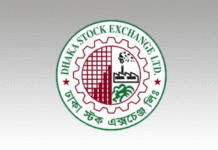

The government’s borrowing from the banking system has started to go up mainly due to its lacklustre performance in revenue collection and falling investment in savings certificates.
The government had borrowed Tk 19,356 crore from banks from July 1 to April 27 of this fiscal year against its fiscal target of Tk 76,452 crore.
But by May 26, the figure had gone up to Tk 26,741 crore, meaning it had borrowed Tk 7,385 in a span of just around one month.
Analysts said government borrowing from banking sources might go up substantially in June since it was the final month of the fiscal year when all dues are usually paid.
The National Board of Revenue (NBR) has still a long way to go to fulfil its fiscal target, which will force the government to avail a hefty amount of loans from banks, they said.
Tax collection stood at Tk 227,756 crore until April against this fiscal year’s target of Tk 330,000 crore, showed data from the NBR.
In addition, investment in national savings certificates has declined to a large extent as the government introduced investment slabs and slashed the interest rate anywhere from 1 percentage point to 3 percentage points on different savings tools last year.
Between July and April this fiscal year, net investment in the tools stood at Tk 17,519 crore, down 50 per cent year-on-year.
Ahsan H Mansur, executive director of the Policy Research Institute of Bangladesh, said the interest rate on treasury bills and bonds would go up as the government had commenced availing loans from banking sources.
T-bills and bonds are the securities used by the government to borrow from banks.
For instance, the interest rate on the 10-year treasury bond stood at 8 per cent in May in contrast to 5.80 per cent a year ago.
The soaring interest rate on the instrument will encourage more to banks to lend to the government, Mansur said.
If the government borrows more, the interest rate on the securities will go up in tandem, he said.
Against this backdrop, banks will try to ignore the private sector when disbursing loans, where the maximum interest rate is 9 per cent, as they have to maintain provisioning against the funds, he said.
In addition, some of the funds disbursed to individuals may also become defaulted, for which lenders are compelled to keep additional provisioning.
But there is no such risk for the funds given out to the government, said Mansur, also a former official of International Monetary Fund.
If the interest rate cap on lending is withdrawn, banks will feel encouraged to disburse loans in the private sector, he said.
Withdrawal of the cap will also ease the ongoing crisis in the balance of payments, he said.
He explained that banks were now buying US dollars in exchange of the taka, which has created pressure on liquidity in the money market.
If the lending rate cap is lifted, the interest rate on post-import financing will increase, Mansur said.
This will ultimately decrease import payments, which will subsequently give respite to the local currency from the ongoing pressure of the exchange rate against the US dollar.
Mirza Elias Uddin Ahmed, managing director of Jamuna Bank, said June’s auction calendar, which was a schedule of government borrowing prepared by the finance ministry, has given an indication that an increasing amount of loans would be taken from banks this month.
Against this backdrop, the interest rate on the T-bills and bonds will increase further, which is positive for banks, he said.
Banks have to face different risks when disbursing funds among individuals, he said.
The liquidity situation in the banking sector is now under pressure, he said.
He reckons that the central bank may reduce the supply of the taka to the market so as to contain inflation.
Depreciation of the local currency against the US dollar has left an adverse impact on inflation, Ahmed said.
Inflation shot up to 6.29 per cent in April, the highest in 18 months, amidst food prices and non-food prices staying persistently high, data from the Bangladesh Bureau of Statistics.
Mustafizur Rahman, a distinguished fellow at the Centre for Policy Dialogue, however, said borrowing money from banking sources was not a bad practice, rather the government should strengthen its skills in spending the funds efficiently.
He said deficit financing of the government stood at Tk 17,897 crore in the first half of FY 2020-21, but there was no deficit during the same period of this fiscal year.
The deficit turned into a surplus between July and December of this fiscal year when the figure stood at Tk 1,130 crore.
The government borrowing from the banking sources stood at Tk 28,432 crore in FY21 and Tk 79,268 crore in FY 20.










